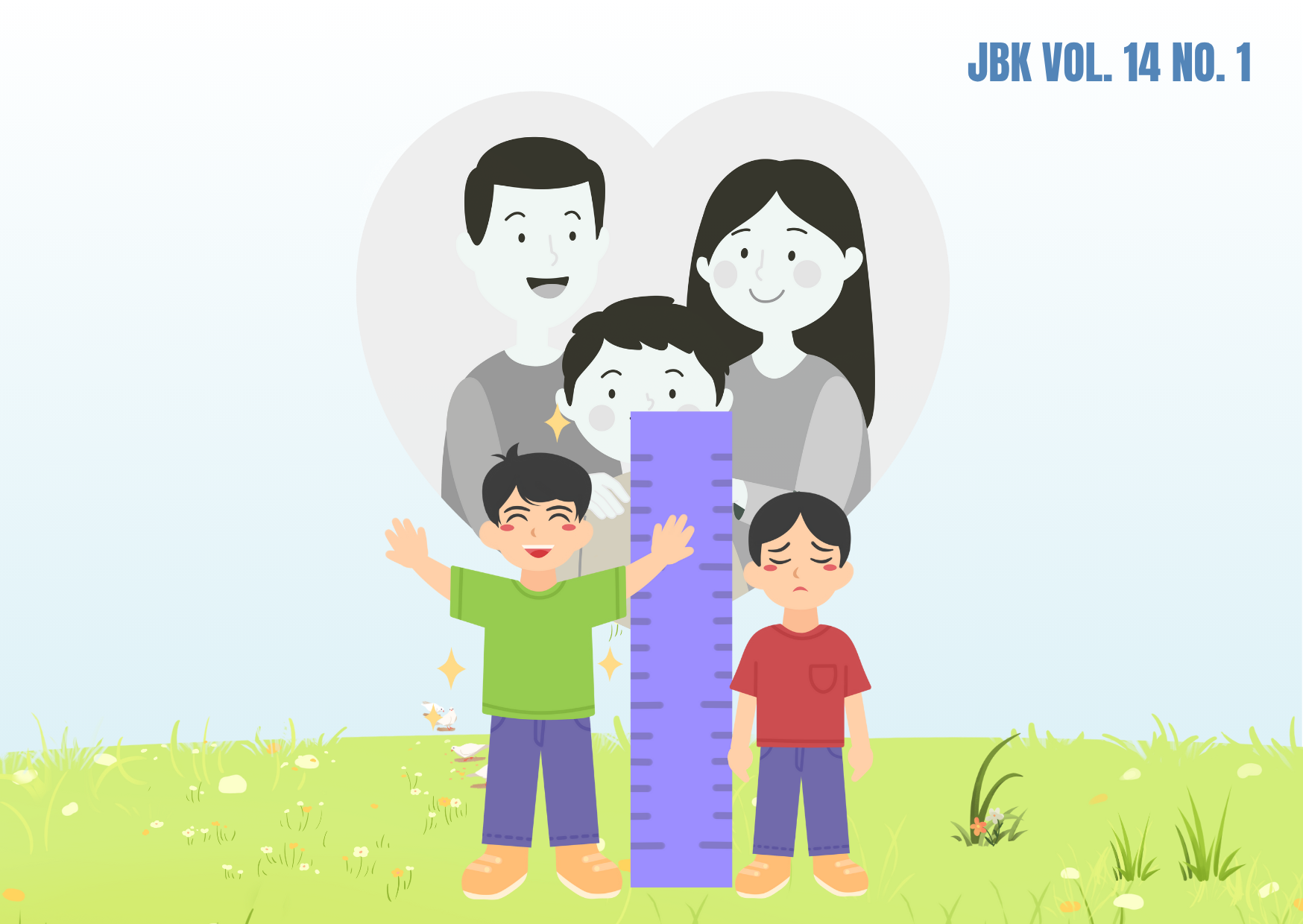PARENTING BEHAVIOUR AND STUNTING PREVENTION IN SOUTH SULAWESI PROVINCE, INDONESIA

Downloads
Stunting in children is influenced not only by food availability but also by various factors such as family caregiving practices, which in many cases remain suboptimal. There are still families who have not practiced optimal parenting patterns. This study aims to determine family parenting behavior and analyze factors that can support increased efforts to prevent stunting in toddlers. The study used a quantitative approach with a survey method, the population was all families with toddlers in South Sulawesi Province and 260 families as samples. The data were processed and analyzed through three stages: univariate analysis to describe the characteristics of the variables, bivariate analysis using the Chi-square statistical test (with Yates’ correction) to see the relationship between variables, and multivariate analysis using a binary logistic regression model. The study's results showed a positive relationship between parenting behavior and parenting knowledge, environmental sanitation knowledge, nutritional knowledge, parenting attitudes, parenting motivation, family planning, and culture (p<0.05). Meanwhile, the variables of environmental health knowledge and environmental sanitation attitudes did not show a significant relationship (p>0.05). The main strategies for interventions to improve family parenting behavior in efforts to prevent stunting are culture (B=2.492;p=0.000), environmental sanitation knowledge (B=1.936;p=0.000), family planning (B=1.429;p=0.030), and parenting attitudes (B=1.003;p=0.000). Recommendations include involving local stakeholders, including community leaders, religious leaders, and regional organizations in supporting family parenting efforts in controlling stunting through increasing environmental sanitation knowledge, family planning, and positive parenting attitudes based on local wisdom.
Indonesia Ministry of National Development Planning (BAPPENAS) and the United Nations Children’s Fund (UNICEF). SDG Baseline Report on Children in Indonesia. 2017.
O’Neill DW. The first 1,000 days: A crucial time for mothers and children - And the world by Roger Thurow, Hachette Book Group, 2016. Christian Journal for Global Health. 2020;7(3):23–7.
Ministry of Health. Indonesian Health Survey 2023. 2023.
UNICEF and Ministry of Health. Menuju Masa Depan Indonesia Bebas Masalah Kekurangan Gizi. Wirawan NN, editor. Www.Unicef.Org. Jakarta; 2023. 1–12 p.
Soliman A, De Sanctis V, Alaaraj N, Ahmed S, Alyafei F, Hamed N, et al. Early and Long-term Consequences of Nutritional Stunting: From Childhood to Adulthood. Acta Biomedica. 2021;92(1):1–12.
WHO. Nutrition and Food Safety [Internet]. World Health Organization. 2025. Available from: https://www.who.int/teams/nutrition-and-food-safety/monitoring-nutritional-status-and-food-%0Asafety-and-events/joint-child-malnutrition-estimates/latest-estimates?utm_source=chatgpt.com
Putri Isnur, Andrean W. FInaka. Semangat Terus! Menuju Indonesia Zero Stunting. Indonesiabaik.id [Internet]. 2024 [cited 2025 Jul 16]; Available from: https://indonesiabaik.id/infografis/semangat-terus-menuju-indonesia-zero-stunting
Stunting Tantangan Terbesar di Makassar, Pemkot Targetkan Penurunan jadi 14%. 2024 [cited 2025 Jul 29]; Available from: https://macassar.id/2024/10/19/stunting-tantangan-terbesar-
S. Bachtiar. Kadinkes Jeneponto Paparkan Data Pengukuran Balita. Terkini.id, Jeneponto [Internet]. 2023 [cited 2025 Jul 29]; Available from: https://jeneponto.terkini.id/2023/06/09/kadinkes-jeneponto-paparkan-data-pengukuran-balita-160-gizi-buruk-stunting-1699-persen
Packer L, Cadenas E. The Biology of The First 1000 Days. Karakochuk CD, Whitfield KC, Green TJ, Kraemer K, editors. The Biology of the First 1,000 Days. Los Ageles, California: CRC Press Taylor & Francis Group; 2018. 259 p.
Anhusadar L, Islamiyah I. Penerapan Perilaku Hidup Bersih dan Sehat Anak Usia Dini di Tengah Pandemi Covid 19. Jurnal Obsesi : Jurnal Pendidikan Anak Usia Dini. 2020;5(1):463.
Sunderland M. The Science of Parenting: How Today ’s Brain Research Can Help You Raise Happy, Emotionally Balanced Children. DK Penguin Random House; 2016. 304 p.
Utomo B, Sucahya PK, Romadlona NA, Robertson AS, Aryanty RI, Magnani RJ. The impact of family planning on maternal mortality in Indonesia: what future contribution can be expected? Popul Health Metr. 2021;19(1):1–13.
Jahdiah J. Nilai-Nilai Kearifan Lokal Dalam Pola Pengasuhan Anak Masyarakat Banjar:Kajian Etnolinguistik. PRASASTI: Journal of Linguistics. 2022;7(2):166–72.
Vilcins D, Sly PD, Jagals P. Environmental risk factors associated with child stunting: A systematic review of the literature. Ann Glob Health. 2018;84(4):551–62.
de Onis M, Branca F. Childhood stunting: A global perspective. Matern Child Nutr. 2016;12:12–26.
Azis R, Rifai M, Setiahati NK. Analisis Faktor Risiko Ibu Dan Anak Balita Terhadap Stunting Di Wilayah Kerja Puskesmas Sangurara, Kecamatan Tatanga, Palu. PREPOTIF : Jurnal Kesehatan Masyarakat. 2021;5(2):870–81.
Arsyad JF, Samsi AS, Astari C, Sakaria FS, Annisa RN, Unde AA. Case study of toddlers stunting care practices in coastal communities. Enferm Clin. 2020;30(S2):462–5.
Al Uluf U, Mahmudiono T, Mahmudah, Melaniani S. Determinant of Stunting among Children 15-49 Months in Zambia (Zambia DHS Analysis 2018). J Biometrika dan Kependud. 2022;11(2):194–203.
Dhingra S, Pingali PL. Effects of short birth spacing on birth-order differences in child stunting: Evidence from India. Proc Natl Acad Sci U S A. 2021;118(8):1–8.
Devi A, Wibowo K, Puspitaningrum AN, Ma’ruf M, Irham LM, Supadmi W, et al. Identification of Biomarkers for Stunting Through Genetic Variant Analysis. Journal of Pharmaceutical Science. 2024;21(1):25–32.
Suwardi S, Rahmawati S. Pengaruh Nilai-Nilai Kearifan Lokal Terhadap Pola Pengasuhan Anak Usia Dini (AUD). Jurnal Al-Azhar Indonesia Seri Humaniora. 2019;5(2):87–92.
Casando NI, Hapis AA, Wuni C. Hubungan Pendidikan Ibu, Pengetahuan, Sikap dan Pola Asuh terhadap Status Gizi Anak. Jurnal Inovasi Penel. 2022;2(8):2429–32.
Rajagukguk M. Hubungan Pengetahuan Pola Asuh dan Pola Makan pada Balita (Relationship between Knowledge of Parenting Patterns and Eating Patterns in Toddlers). Journal of Social and Cultural Anthropology. 2022;7(2):204–13.
Rettob KK, Adnani H. Pengetahuan Ibu Balita tentang Gizi dan Pola Pemberian Makan dengan Status Gizi Balita. Health Sciences and Pharmacy Journal [Internet]. 2023 [cited 2025 Jun 9];7(1):167–74. Available from: https://journal.stikessuryaglobal.ac.id/index.php/hspj/article/view/784
Mahbubah Qatrunnada, Fathurrahman, Siti Mas’odah. Hubungan Pengetahuan Ibu, Pola Asuh dan Ketahanan Pangan Rumah Tangga dengan Kejadian Stunting pada Balita. Jurnal Kesehatan Tambusai [Internet]. 2023 [cited 2025 Jun 8];4(3):3567–74. Available from: https://journal.universitaspahlawan.ac.id/index.php/jkt/article/view/15847/13979
Astuti CGT, Yugistyowati A, Dewi IM. Hubungan Pengetahuan Ibu tentang Gizi dan Pola Asuh Pemberian Makan terhadap Kejadian Stunting pada Balita di Desa Margomulyo. Juru Rawat: Jurnal Update Keperawatan [Internet]. 2024 [cited 2025 Jun 9];4(2):42–9. Available from: https://ejournal.poltekkes-smg.ac.id/ojs/index.php/JUK/article/view/11845/3935?utm_source=chatgpt.com
Zhafira SN, Pangestuti DR, Kartini A. Low Maternal Nutrition Knowledge and Insufficient Energy Intake in Toddlers as Risk Factors for Stunting in Agricultural Areas. Amerta Nutrition [Internet]. 2024 [cited 2025 Jun 9];8(3):259–68. Available from: https://e-journal.unair.ac.id/AMNT/article/view/63145/31679
Saputri UA, Pangestuti DR, Rahfiludin MZ. Pengetahuan Gizi dan Pola Asuh Ibu sebagai Faktor Risiko Stunting Usia 6-24 Bulan di Daerah Pertanian. Media Kesehatan Masyarakat Indonesia [Internet]. 2021;20(6):433–42. Available from: https://ejournal.undip.ac.id/index.php/mkmi
Pillai A, Kinabo J, Krawinkel MB. Effect of nutrition_Effect of nutrition education on the knowledge scores of urban households with home gardens in Morogoro, Tanzania. Agric Food Secur [Internet]. 2016;5(1):1–8. Available from: https://agricultureandfoodsecurity.biomedcentral.com/articles/10.1186/s40066-016-0069-1
Sefty AD, Khairani MD, Abdullah, Muharramah A. Tingkat Pengetahuan Ibu terkait Gizi dan Pola Pemberian Makan dengan Gizi Kurang pada Balita Usia 6-59 Bulan di Desa Pakuan Aji Kabupaten Lampung Timur. Media Gizi Pangan [Internet]. 2024 [cited 2025 Jun 9];31(2):232–9. Available from: https://ojs3.poltekkes-mks.ac.id/index.php/megiz/article/view/856/435
Sari YK, Saputra N, Ajani AT. Hubungan Sanitasi Lingkungan, Pola Asuh dan Pola Makan dengan Kejadian Stunting pada Balita di Wilayah Kerja Puskesmas Sijunjung. HEME: Health and Medical Journa [Internet]. 2024 [cited 2025 Jun 10];6(1):42–8. Available from: https://jurnal.unbrah.ac.id/index.php/heme/article/view/1369/pdf
Maryani N, Novita A, Hanifa F. Hubungan Pola Pemberian Makan, Pola Asuh dan Sanitasi Lingkungan dengan Kejadian Stunting pada Balita Usia 12-59 Bulan di Desa Babakan Kecamatan Ciseeng Tahun 2022. SIMFISIS Jurnal Kebidanan Indonesia. 2023 Feb 10;2(3):396–403.
Nasution SS, Girsang BM, Hariati H. Evaluation of the Effect of Sociocultural Factors on the Children Stature in Langkat Regency, Indonesia. Open Access Maced J Med Sci. 2021 May 24;9(E):461–6.
Wulandari H, Kusumastuti I. Pengaruh Peran Bidan, Peran Kader, Dukungan Keluarga dan Motivasi Ibu terhadap Perilaku Ibu dalam Pencegahan Stunting pada Balitanya. Jurnal Ilmiah Kesehatan [Internet]. 2020 Aug 11 [cited 2025 Jun 11];19(2):73–80. Available from: https://journals.stikim.ac.id/index.php/jikes/article/view/548
Wiliyanarti PF, Wulandari Y, Nasrullah D. Behavior in fulfilling nutritional needs for Indonesian children with stunting: Related culture, family support, and mother’s knowledge. J Public Health Res. 2022;11(4).
Solomon D, Kebede Z, Bogale F, Ababor S, Ararso D, Woldie E, et al. Reducing Stunting in Ethiopia:“From Promise to Impact” [Internet]. Ethiopian Public Health Institute. 2019. Available from: https://ephi.gov.et/wp-content/uploads/2014/04/B-Stunting-policy-brief-full-report-05-23-19.pdf
Chakona G, Shackleton C. Food taboos and cultural beliefs influence food choice and dietary preferences among pregnant women in the eastern Cape, South Africa. Nutrients. 2019;11(11):1–18.
Huda SN, Kartasurya MI, Sulistiyani. Perilaku Berpantang Makan pada Ibu Hamil Suku Dayak di Kabupaten Sintang Kalimantan Barat [Internet]. 2019 [cited 2025 Jun 13]. Available from: https://ejournal.undip.ac.id/index.php/jmki/article/view/22454?
Ningtyias FW, Kurrohman T. Pencegahan Stunting pada Suku Osing: Studi Fenomenologi Pantangan dan Anjuran Makanan Bagi Ibu Hamil (Preventing Stunting in Osing Tribe: The Study of Phenomenology of Food Taboo’s and Recomended Food for Pregnan Woman). In: Bohari, editor. Preventing Stunting Through Food and Nutrition Family Self-Sufficiency in The First 1000 Days of Life [Internet]. Palu: Fakultas Kesehatan Masyarakat, Universitas Tadulako; 2018 [cited 2025 Jun 14]. p. 31–9. Available from: http://repository.unej.ac.id/handle/123456789/87044
Bahar H, Muchtar F, Putri LAR. Kondisi Sosial Budaya Berpantang Makanan dan Perawatan Kehamilan pada Suku Tolaki (Studi Kasus Pada Masyarakat Pesisir Kota Kendari) Tahun 2019. Preventif Journal [Internet]. 2020 [cited 2025 Jun 15];4(2):74–7. Available from: https://ojs.uho.ac.id/index.php/preventifjournal/article/view/12441/8761
Yasir LA, Hertin PI, Martiana BDA, Nabila H, Erniwati L. Cultural Abstinence in Food for Breastfeeding Mothers on Stunting Incidents in Batu Tinggang Hamlet, Labulia Village, Jonggat District, Central Lombok Regency, West Nusa Tenggara. Health Media [Internet]. 2023 [cited 2025 Jun 14];5(1):19–26. Available from: https://journal.urbangreen.co.id/index.php/healthmedia/article/view/163
Pan Q, Chen S, Qu Y. Corporal punishment and violent behavior spectrum: a meta-analytic review. Vol. 15, Frontiers in Psychology. Frontiers Media SA; 2024. p. 1–10.
Larzelere RE, Gunnoe ML, Pritsker J, Ferguson CJ. Resolving the Contradictory Conclusions from Three Reviews of Controlled Longitudinal Studies of Physical Punishment: A Meta-Analysis. Marriage and Family Review. Routledge; 2024.
Boibalan FY, Rahmadiyah DC, Permatasari H, Wiarsih W. Peran ayah dalam penanganan stunting: A systematic review. Holistik Jurnal Kesehatan [Internet]. 2025 Jan 31;18(11):1140–449. Available from: https://e-jurnal.iphorr.com/index.php/hjk/article/view/650
Copyright (c) 2025 Jurnal Biometrika dan Kependudukan

This work is licensed under a Creative Commons Attribution-NonCommercial-ShareAlike 4.0 International License.
Copyright ©2022 Jurnal Biometrika dan Kependudukan (Journal of Biometrics and Population)
This work is licensed under a Creative Commons Attribution-NonCommercial-ShareAlike 4.0 International License.
1. Copyright of all journal manuscripts is held by the Jurnal Biometrika dan Kependudukan.
2. Formal legal provisions to access digital articles of the electronic journals are subject to the provision of the Creative Commons Attribution-ShareAlike license (CC BY-NC-SA), which means that Jurnal Kesehatan Biometrika dan Kependudukan to keep, transfer media/format, manage in the form of databases, maintain, and publish articles.
3. Published manuscripts both printed and electronic are open access for educational, research, and library purposes. Additionally, the editorial board is not responsible for any violations of copyright law.



































